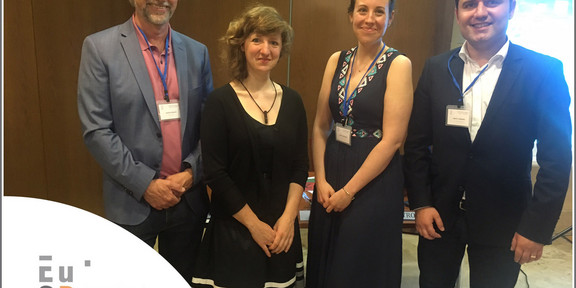Four lectures by researchers of TU Dortmund University at Eu-SPRI 2019 in Rome

Eu-SPRI (European Forum for Studies of Policies for Research and Innovation) is one of the most important research consortia on science, technology and innovation in Europe. Members and associates of the network meet annually. This year, the Eu-SPRI conference took place in Rome from the 5th to the 7th of June. Four researchers from TU Dortmund University were invited to present their research results and current projects.
The opening event of the conference took place in the impressive lecture hall of the National Research Council in the center of Rome. Economist and former Italian Minister of Social Affairs and Employment Enrico Giovannini welcomed the participants and emphasized the outstanding importance of the European Union with regard to the sustainable societal development in Europe.
Under the title "Understanding Social Innovation Ecosystems: In Search of a Concept", Dmitri Domanski talked about why the debate on ecosystems of social innovation is important for innovation research, and how such a concept could be developed based on the experiences of Innovation Studies.
In the same session, Jennifer Eckhardt presented first results from the EU project SISCODE, within which the partner organizations are looking for ways to promote design-based co-production at the interfaces between science, politics and society. The first part of the research effort consisted in a quantitative exploration of the existing landscape of co-creation, the results of which can be viewed here.
The main point of reference of Marthe Zirngiebl's presentation was the development of a typology of social innovations, as developed in the framework of the research project SI-DRIVE. This typology places social innovation in relation to its function and in interaction with the environment, which is shaped by different routines, institutions and regulations depending on the policy field. This shows that many social innovations take on reparation functions and intervene where local social needs are not satisfied otherwise.
In his presentation "Social Innovation - Opportunity and Challenge for Universities and SSH", Jürgen Howaldt focused on the role of science and specifically of universities as well as research institutes with regard to the development of social innovation. Particular attention was drawn to new opportunities for social science innovation research to actively participate in shaping social transformation processes.
Links




![[Translate to English:] [Translate to English:]](/storages/zentraler_bilderpool/_processed_/a/f/csm_Kontakt_b86e8d8ecc.png)
![[Translate to English:] [Translate to English:]](/storages/sfs-sowi/_processed_/7/e/csm_header_collage_sfs_eving_sozialforschungsstelle_dortmund_31bd3c09fb.jpg)